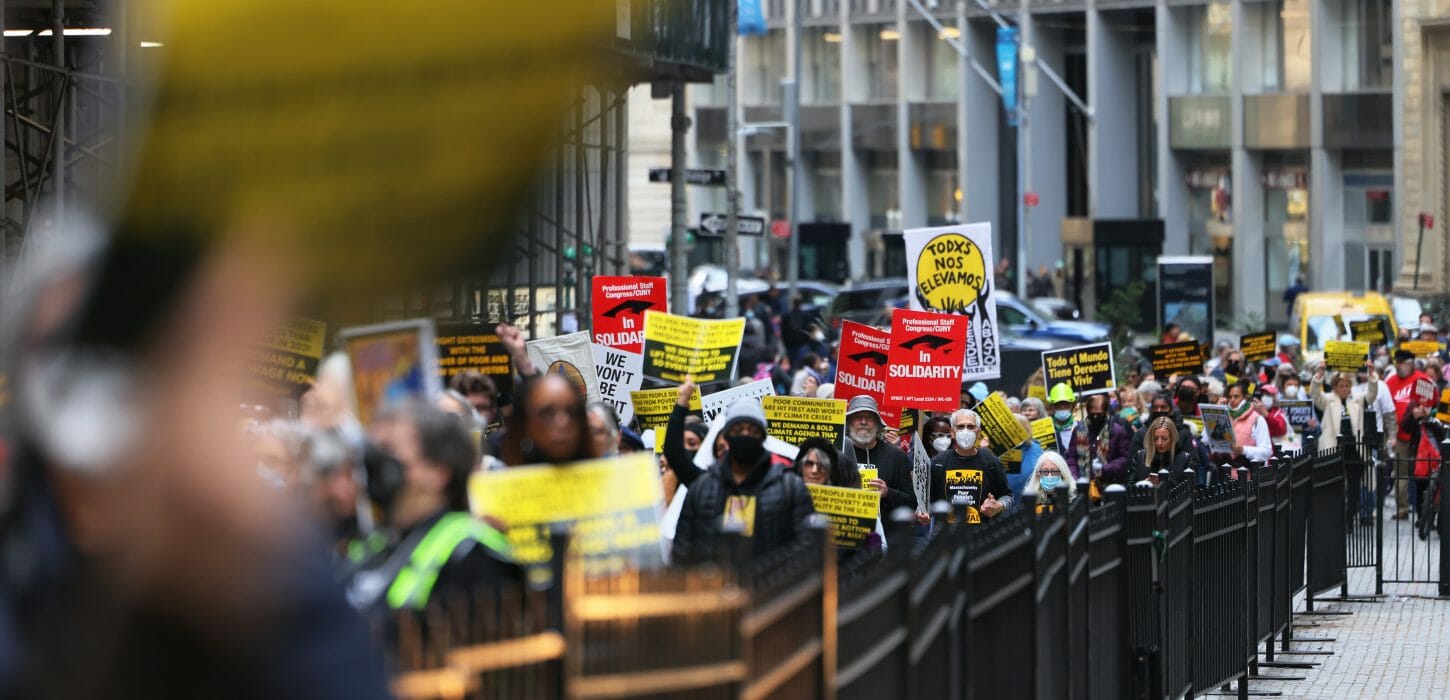Wall Street bonuses averaged $176,700 last year — down from 2021 but still 1,165 percent higher than in 1985. If the federal minimum wage had grown at the same rate, it would be worth $42.37, according to Institute for Policy Studies analysis.
An alliance of essential workers, tenants, and union members are rallying to lift New York state’s minimum wage — not to $42.37 but to a level that would at least help the poorest working families make ends meet. Based on the state’s high cost of living, the Raise Up New York coalition is proposing a floor of $21.25 per hour by 2026, indexed to inflation.
Wall Street payouts far surpass the cost of raising the minimum wage.
That would be the highest minimum wage in the country, but compared to Wall Street payouts, this demand is modest. New York City’s 190,800 Wall Street workers earned a combined $33.7 billion in bonuses for their 2022 performance. The Economic Policy Institute has calculated that raising the state’s minimum wage to $21.25 would cost far less — just $9.5 billion.
In other words, the Wall Street bonus pool is worth 3.5 times what it would cost to raise the minimum wage to a living wage for the nearly 2.9 million New York residents who now earn the current minimum of $15 an hour. It’s worth over 6.6 times what it would cost to raise the minimum wage to a living wage for the nearly 1.4 million New York City workers at the bottom of the wage scale.
If the wage hike proposal passes, minimum wage workers in New York would see an average annual increase of $3,379, a far cry from the typical six-figure Wall Street bonus, which comes on top of generous base salaries. It’s fair game to compare these respective paychecks — and demand policies that reduce the egregious gap between Wall Streeters and minimum wage workers.
“I cannot tell you, in all of the shelters in my district how many times I see mothers and fathers who are employed, have jobs, but are being paid minimum wage, and it is not enough to rent an apartment on their own.” -NYS Senator @jessicaramos #RaiseUpNY 6/ pic.twitter.com/jBaPgaC7XK
— 32BJ SEIU /// #UnionStrong 💪💪🏻💪🏽💪🏿 (@32BJSEIU) March 27, 2023
The Empire State should tax the rich.
If the Empire State remains dependent on skimming off the excess (and excessive rewards) of risky financial behavior, it should at least harness more revenue from the rich through a redistributive state budget.
The Invest in Our NY Coalition advocates raising $40 billion through new taxes and tax reform to invest in public goods. With that kind of money, the state could vastly improve affordable housing and grant tenants more opportunity to purchase apartments. It could expand critical unemployment insurance, fix the subways, and make public university tuition free for state residents.
So will the interests of Wall Streeters or working class New Yorkers win out this budget cycle? Right now the state’s Democratic governor and Democratic-controlled legislature are in a showdown.
Governor Kathy Hochul is proposing only a modest minimum wage increase and zero increases in income taxes for the state’s wealthiest. The legislature’s proposals, by contrast, include meaningfully hiking and inflation-indexing the minimum wage and raising income taxes on residents earning more than $5 million each year by 0.5 percent.
Lawmakers and activists recently joined together for a Tax the Rich Takeover in Albany, highlighting a range of urgent demands to protect low-income New Yorkers. Their dream for the future of the New York economy? Life with dignity and security for all — not shiny new sports cars for the few.
